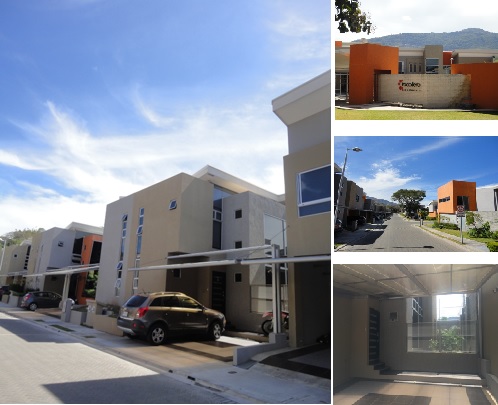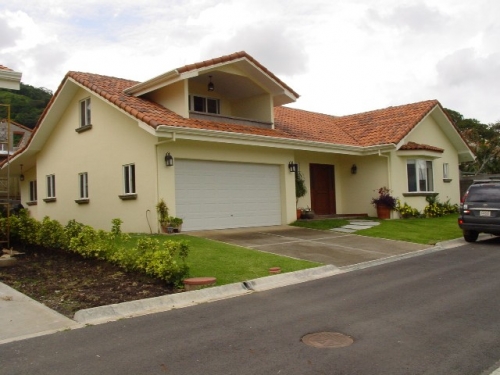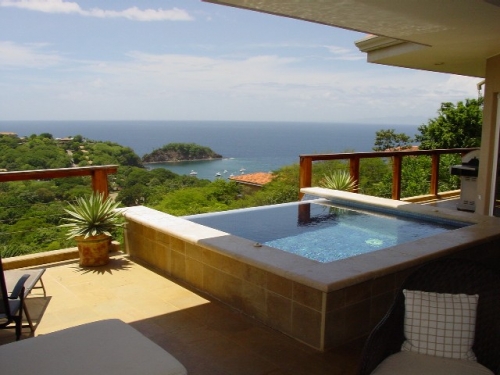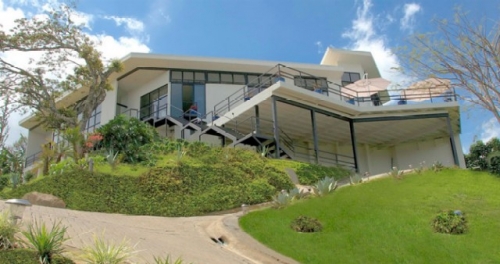Costa Rica Guide
Costa Rica Real Estate
List your property today!
Inclusion of real estate listings at Costa Rica Guide is
absolutely free of charge.
Featured Properties
Costa Rica Guide - Costa Rica Real Estate
Buying Process - Real Estate Information
A Panorama
By Thomas A. Burke, Attorney at Law
Wouldn't we all like to find a secure, tangible, problem-free, income-producing, and enjoyable real estate investment? Wishful thinking isn't it! However, there are many alternatives safely distant from either daydreaming or an overly pessimistic attitude. Your options depend mainly on the specific location in mind and on your preferences and abilities.
More to the point, many of my clients have determined that Costa Rica offers the legal, sociopolitical, and economic environment appropriate for an income-producing investment. However, each has a different personal situation with respect to his or her ability to run a business or personally maintain a real estate investment on a day-to-day basis. It is, therefore, very important to take on a project within your personal scope and, needless to say, within a budget. Let's look at the possibilities.
The principal real estate development modes that are customary, legally allowed, and regulated to varying degrees in Costa Rica include the following options.
Subdevelopments, in which a large property is provided with infrastructure including storm drainage, septic drainage, roads, curbs, sidewalks, playgrounds, park areas, and security fencing. This infrastructure occurs in coordination with a plan for selling individual plots with separate titles to individuals desiring to build a residence or, exceptionally, a place of business. Often the developer will tie the sale of a lot to a contract to build either a model house or one according to the buyer's own design. This requires a large investment, a team of hired professionals and plenty of work to obtain the required health and urban authority approvals. It is also only recommendable for an investor with plenty of local contacts and experience.
Apartment buildings, which can be built either as a single property designed strictly for individual apartment rental or as a condominium with the possibility both of selling the units with a separate title (not possible in the first case) also also renting out the units as apartments. In either case, the more attractive investment would be one aimed at the upper-middle to higher income level. Modest units tend to present more court conflicts under Costa Rica's restrictive rental law, which strongly favors tenants over landlords, whereas rental contracts with higher rates present less defaults and allow (economically) for more accommodation between the parties.
Residential parks, a relatively new trend in Costa Rica, revolve around a restricted access plan involving higher income properties integrated with recreational facilities such as golf courses, tennis courts, swimming pools, and so on. A fundamental element and selling point is the isolation from unwanted traffic and persons in the area. Legally, this is only possible if the development is legally placed under condominium law. Otherwise the access roads must be public. Constitutional law in Costa Rica protects the right of transit on all public roads, thus leaving in doubt the actual level of effectiveness of security measures. It is possible to work within a private condominium scheme if all the building plans for each lot are preapproved, something that is usually neither practical nor economical.
Hotels, ranging from bed and breakfasts to large luxury resorts, are well established in Costa Rica. The latest tourism data show room capacity catching up with demand; however the continued upward trend in overall tourism projected for the rest of the decade allows for more expansion in this area. While government incentives do solve some problems for the investor, particularly in the area of obtaining liquor licenses, telephone connections, and import of foreign-made equipment, the truth is that the cost for required studies, applications, and so on for qualifying under an incentives program make this an option only for large investors whose scale of project makes it possible to use the incentives to a sufficient degree to cover the costs involved in qualifying. This is the reason most bed and breakfasts operate without so much as a municipal license, much less a tourism incentives contract.
Country estates are now being offered usually in hilly areas and often with an ocean view in the northern Guanacaste and southern Lim n regions. In order to legally subdivide a larger property into smaller, separately titled "ranches" and avoid all the red tape and investment attendant to an urban subdevelopment, these must have a minimum of five hectares surface area. It is possible to qualify smaller plots if the Agriculture Ministry (Ministerio de Agricultura y Ganaderia) will certify that the proposed split size is agriculturally viable. The criteria on this varies depending on the region in question. In any case, in order to offer this type of property it is a marketing must to also offer at least water and roads along with maintenance. Once such a development is sold out, the owners are usually left to their own devices in terms of maintenance and must form an owner's association for this purpose. The same applies to those rural subdevelopments typically near the shore that, although composed of smaller "urban" lots, do not have an effective local government supplying municipal services.
Hotels and villas. A more novel approach is the combination of beach hotel including a central area with the usual bar, restaurant, and recreational facilities. The rental units are bungalows with 1-2 bedrooms that serve as hotel units and that are also offered to investors interested in an income property. Investors "purchase" a unit with a management contract from the hotel that provides for maintenance and renting out of the unit for a percentage of the income, leaving a net income for the investor plus the right of personal use for a determined number of weeks per year. Since these units do not qualify for a separate title of ownership under urbanization regulations, nor are they separately titled condominium units, one cannot actually purchase a property right per se to the unit. The way found around this inconvenience has been to offer long-term leases (99 years) on the units and register the lease contracts on the property record of the hotel development. The leases are made transferable but are obviously not equal to a permanent property title.
Condo-hotels. This option offers real estate security and appreciation, as well as producing income on a monthly basis with a built-in management system. The single or duplex units are usually sold to persons wishing to enjoy a month or so in Costa Rica every year in the area where the condominium is located, often along the coast. The developer offers a management contract along with the sale, which should spell out responsibilities for the payment of management fees and commissions (usually include cost of reception, maid, and laundry services), condominium (common) maintenance expenses, hotel equipment and supplies, repairs and replacements, promotional services, utilities, land and municipal taxes, income tax, and so on. As anywhere else, a condominium involves periodic owners' meetings to approve budget and management policies. In my opinion the key element is a knowledgeable manager, able to balance not only conflicting interests but also successfully separate and account for management income, condominium maintenance income, and the commercial rental income.
Stock-held units reflect the desire of the developer to avoid restrictions built into condominium rules, subdevelopments, and/or typical hotel arrangements, allowing for individual real estate-backed investment while maintaining a strong corporate control over and responsibility for the project. Preferred stock is usually issued specifying the right to exclusive enjoyment of an individual apartment, villa, bungalow, and so on. Here the key element is finding a fair balance of control protecting the rights of the holders of the preferred stock and those of the developer, whose corporate business risks and fortune can affect those of the former.
Residences. Due to its climate, political stability, and relatively high living standards, Costa Rica enjoys regional supremacy in hosting diplomatic, corporate, and international organizations' headquarters. This provides for a steady demand for luxurious residences on a rental basis. Most tenants come ready with an approved allotment for housing, a fairly good idea about how long they will stay in the area, and once settled in, a desire to remain in the particular residence. This investment will provide a very stable return and above average appreciation as most areas suitable for such residences are already very limited in terms of expansion possibilities.
This list of short descriptions is meant to help the interested investor sort out ideas and focus on specifiic modes. In the end, one must decide between the advantages of one particular type of real estate investment and those of another. It is tempting but counterproductive to try to confuse aspects of one kind of development with those of another, as each usually has legal rules that make this largely impossible.
As a last word, let me state for the record that I do not have a vested interest in any project similar to those described in this article. If you are interested in obtaining information on concrete possibilities, please contact a reputable real estate agency that speaks your language and can relate to your desires in this area. An attorney's role should avoid conflicts of interest, should control title, should advise on legal permits and restrictions, perhaps even give the benefit of practical advice based on local experience, and eventually, securely document your investment as part of your team.
About the author: Thomas A. Burke is a member of the Costa Rican Bar Association, with years of experience in investment consulting and business administration in Costa Rica. He speaks fluent English, Spanish, German, and French.
Please contact the author to obtain professional Costa Rica real estate legal advice.
Copyright 1996-2004
Note: The above information is not to be used for any other purpose other than private study, research, criticism or review. Thank you.






